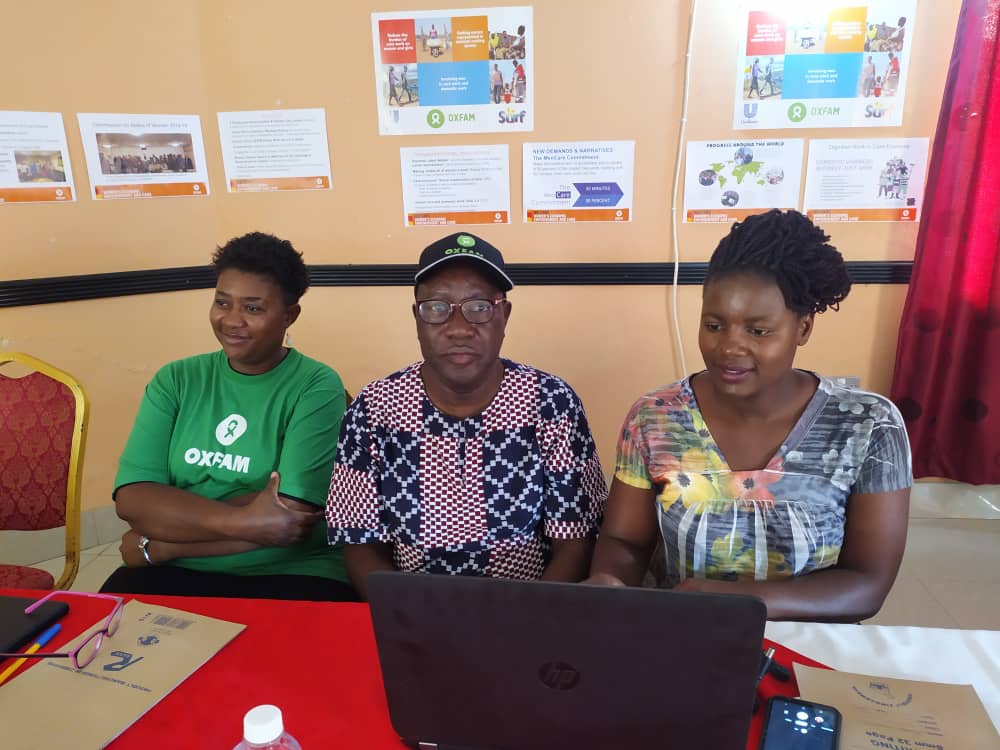Oxfam’s Women Economic Empowerment and Care (WE CARE) also known as the ‘Work your Dreams project in Zimbabwe’ is working on exploring how to break the barrier of unpaid care work that limits women’s empowerment and their participation in all spheres of life.
Basically the project explores how unpaid care work serves as a barrier to women’s empowerment in all aspects of their lives.
Nomthandazo Jones, Oxfam in Zimbabwe Gender Project Officer said unpaid care work is the provision of services for family and community members outside of the market.
The gender expert said women’s heavy and unequal responsibility for unpaid care work serves as a barrier to their economic, political, and social empowerment.
She was speaking during the training for journalists underway in Mazowe from 17 to 19 March 2020 that focused on the recognition, reduction redistribution, and representation of unpaid care and domestic work in Zimbabwe.
“Under the project, the theory of change is, if care workload is reduced and redistributed, women will have more time and will, therefore, be able to choose to engage in a range of social, economic and political activities which will help them to improve their lives,” Jones said.
Regis Mtutu, Oxfam in Zimbabwe Social Norms Advisor emphasised that the ‘We Care In Zimbabwe’ project adopts the 4Rs approach for transforming care work.
He said, on one hand, the focus is on reducing the amount and intensity of the unpaid care work done by poor women and girls through the provision of infrastructure, services and equipment such as (but not limited to) water and laundry facilities, which make care tasks less tiring and time-consuming to perform, and improve health and well-being.
On the other, the focus is on shifting social norms and gender roles about care work towards a more equitable division of care responsibility between women and men in households and communities.
Equally important is advocating government and other decision-makers at local, regional, and national levels (where appropriate), to fulfill their own responsibilities for unpaid care and make changes to policies, practices, infrastructure, and services, which will facilitate and support care work.
The project works well through bringing together beneficiaries and emphasising on partnerships.
The project has reached out to 25,000 direct women beneficiaries in the districts of Bubi, Gutu, Masvingo Rural and Zvishavane through the provision of WASH, laundry facilities, and time and labour saving infrastructure and equipment, 2,570 care champions and role models including families and role models, as well as 90 policymakers at the national level.
“The project is working with a range of partners to achieve the maximum results and impact. At a community level, the project worked mainly with women’s rights organization as one of the key elements identified in our Strategy, to build the capacity of the women’s movement to better articulate and shape the discourse around the recognition and redistribution of care work.
“Thus, a large component of the work includes using innovative ways of challenging social norms that increase the burden of care work on women and also impede men’s participation in care work. We have done this through the training of local men and women who are care champions and engage local communities on issues of care work,” Mtutu said.
The identified organizations have worked with Oxfam as the WASH technical partner, to identify, prototype and come up with innovative time and labor-saving technologies, infrastructure, and equipment to reduce the workload on women and girls.
All interventions are informed by community participation and solutions, including technical and social feasibility studies to determine what works best.
“This includes rehabilitation of water points, new water points and piped water schemes to cut down on distances and therefore time, laundry facilities at water points, innovations such as solar irons, water containers and so forth.
Furthermore, partnership with Padare/Enkundleni Men’s Forum on Gender, which works with men and boys is strengthened to also ensure buy-in by traditional and local leaders and stakeholders, as well as the participation of men and boys in the redistribution of care work.
This included care champions/male advocates, role model families, boys care clubs in schools, cooking, and laundry competitions. Again, the project ensured that relevant government ministries, such as the Ministry of Women’s Affairs are actively involved throughout the project life.
At the national level, Advocacy and Influencing around the issues raised at the community level around unpaid care work was carried out by the Women’s Coalition in Zimbabwe through both its technical lead around gender budgeting as well as utilising the expertise it has gotten over the years around advocacy with policymakers.






